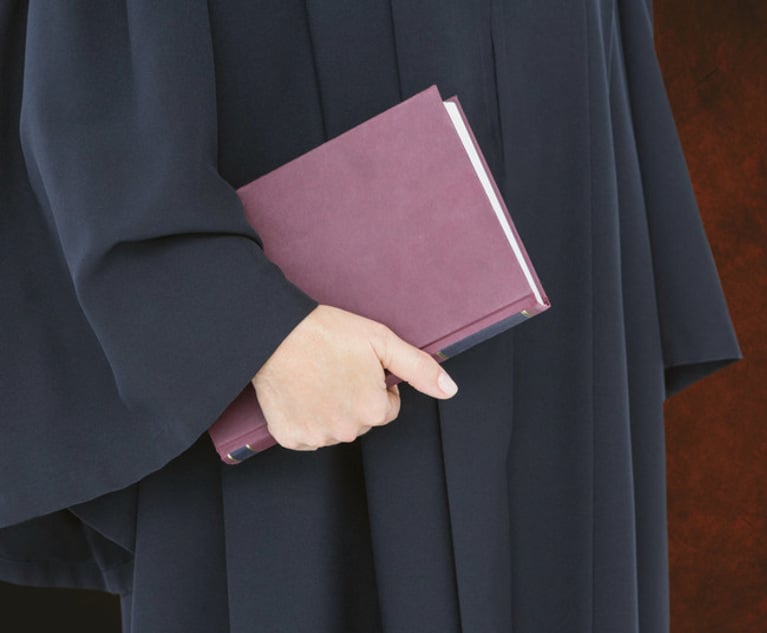 Judge Amy Totenberg (Courtesy photo)
Judge Amy Totenberg (Courtesy photo)Judge Hears Arguments in Georgia Voting Machine Case
Plaintiffs are asking U.S. District Judge Amy Totenberg to order the state to immediately stop using the current system, which they fear would be used in 2020 if a new system isn't implemented in time.
July 26, 2019 at 08:53 AM
5 minute read
Lawyers for election integrity activists grilled Georgia election officials about cybersecurity measures taken to protect the state's elections infrastructure, seeking Thursday to convince a judge to order an immediate halt to the state's use of outdated voting machines.
Their federal lawsuit argues that the paperless touchscreen voting machines Georgia has used since 2002 are unsecure, vulnerable to hacking and can't be audited. It seeks statewide use of hand-marked paper ballots.
A law passed this year and signed by Gov. Brian Kemp provides specifications for a new system, which state officials said will be in place for the 2020 presidential election.
But the plaintiffs are asking U.S. District Judge Amy Totenberg to order the state to immediately stop using the current system, which it plans to use for special and municipal elections this year and which the plaintiffs fear would be used in 2020 if a new system isn't implemented in time.
A hearing on those requests began Thursday and is expected to continue Friday.
The plaintiffs' lawyers questioned election administration officials about the connections between various parts of the elections infrastructure and security measures taken to protect it. The judge also heard from voters who had experienced problems voting in last year's midterm elections.
The plaintiffs' lawyers focused on risk assessment reports from a cybersecurity firm hired by the secretary of state's office, noting that the firm identified 22 risks 2017, and only three of those problems had been completely remedied when another assessment report was done in November 2018.
Merritt Beaver, chief information officer for the secretary of state's office, said officials have continued to work on the problems identified.
Georgia's voting system drew national scrutiny last year during the closely watched governor's race in which Kemp, a Republican who was the state's top election official at the time, narrowly defeated Democrat Stacey Abrams.
The plaintiffs in this case — the Coalition for Good Governance and individual voters — asked Totenberg last August to force Georgia to use hand-marked paper ballots for the November election. While Totenberg expressed grave concerns about vulnerabilities in the state's voting system and scolded state officials for being slow to respond to evidence of those problems, she said a switch to paper ballots so close to that election would be too chaotic.
The plaintiffs argued in court filings that the state has done nothing to address the problems, and the outdated machines should not be used. They argue a switch to hand-marked paper ballots would be relatively easy since the state already uses such ballots for absentee and provisional voting, and the scale is smaller given that there are no statewide elections this year.
In addition to the use of hand-marked paper ballots, they asked the judge to order the state to take some other immediate steps, including post-election audits to verify results.
Lawyers for state election officials, including Secretary of State Brad Raffensperger, argued in court filings that concrete steps have been taken to address the concerns, including arranging for the purchase of new voting technology and adding security measures to existing systems.
They also argued that paper ballots have vulnerabilities and that putting an intermediate system in place while the state is moving to a new voting system would be “an impossible burden” on state and local election officials.
The new law calls for voters to make their selections on electronic machines that print out a paper record that is read and tallied by scanners. The state is expected to choose a vendor soon. The request for proposals specifies that vendors must be able to distribute all voting machine equipment before March 31, which is a week after the state's presidential primary election is set to be held on March 24.
The plaintiffs argue the ballot-marking machines provided for in the new law have many of the same fundamental flaws as the machines they're replacing. They say any system that puts a computer between the voter and the permanent record of the vote can't be effectively audited and is unconstitutional. They've said they plan to challenge the new system once the state announces which machines it plans to use.
The plaintiffs also say the state's plan to implement a new system statewide in time for the 2020 elections is extremely ambitious and that putting a hand-marked paper ballot system in place now would be a secure and constitutional backup plan, unlike using the current system.
This lawsuit is one of several that challenge various aspects of Georgia's election system.
Another, filed by a group founded by Abrams, alleges systemic problems in the election system and accuses election officials of mismanaging the 2018 election.
This content has been archived. It is available through our partners, LexisNexis® and Bloomberg Law.
To view this content, please continue to their sites.
Not a Lexis Subscriber?
Subscribe Now
Not a Bloomberg Law Subscriber?
Subscribe Now
NOT FOR REPRINT
© 2025 ALM Global, LLC, All Rights Reserved. Request academic re-use from www.copyright.com. All other uses, submit a request to [email protected]. For more information visit Asset & Logo Licensing.
You Might Like
View All
Spalding Jurors Return $12M Verdict Against State Farm Insurance Client
10 minute read

Trending Stories
- 1Courts, Lawyers Press On With Business as SoCal Wildfires Rage
- 2Florida, a Political Epicenter, Is the Site of Brownstein Hyatt's 13th Office
- 3Law Firms Close Southern California Offices Amid Devastating Wildfires
- 4Lawsuit alleges racial and gender discrimination led to an Air Force contractor's death at California airfield
- 5Holland & Knight Picks Up 8 Private Wealth Lawyers in Los Angeles
Who Got The Work
Michael G. Bongiorno, Andrew Scott Dulberg and Elizabeth E. Driscoll from Wilmer Cutler Pickering Hale and Dorr have stepped in to represent Symbotic Inc., an A.I.-enabled technology platform that focuses on increasing supply chain efficiency, and other defendants in a pending shareholder derivative lawsuit. The case, filed Oct. 2 in Massachusetts District Court by the Brown Law Firm on behalf of Stephen Austen, accuses certain officers and directors of misleading investors in regard to Symbotic's potential for margin growth by failing to disclose that the company was not equipped to timely deploy its systems or manage expenses through project delays. The case, assigned to U.S. District Judge Nathaniel M. Gorton, is 1:24-cv-12522, Austen v. Cohen et al.
Who Got The Work
Edmund Polubinski and Marie Killmond of Davis Polk & Wardwell have entered appearances for data platform software development company MongoDB and other defendants in a pending shareholder derivative lawsuit. The action, filed Oct. 7 in New York Southern District Court by the Brown Law Firm, accuses the company's directors and/or officers of falsely expressing confidence in the company’s restructuring of its sales incentive plan and downplaying the severity of decreases in its upfront commitments. The case is 1:24-cv-07594, Roy v. Ittycheria et al.
Who Got The Work
Amy O. Bruchs and Kurt F. Ellison of Michael Best & Friedrich have entered appearances for Epic Systems Corp. in a pending employment discrimination lawsuit. The suit was filed Sept. 7 in Wisconsin Western District Court by Levine Eisberner LLC and Siri & Glimstad on behalf of a project manager who claims that he was wrongfully terminated after applying for a religious exemption to the defendant's COVID-19 vaccine mandate. The case, assigned to U.S. Magistrate Judge Anita Marie Boor, is 3:24-cv-00630, Secker, Nathan v. Epic Systems Corporation.
Who Got The Work
David X. Sullivan, Thomas J. Finn and Gregory A. Hall from McCarter & English have entered appearances for Sunrun Installation Services in a pending civil rights lawsuit. The complaint was filed Sept. 4 in Connecticut District Court by attorney Robert M. Berke on behalf of former employee George Edward Steins, who was arrested and charged with employing an unregistered home improvement salesperson. The complaint alleges that had Sunrun informed the Connecticut Department of Consumer Protection that the plaintiff's employment had ended in 2017 and that he no longer held Sunrun's home improvement contractor license, he would not have been hit with charges, which were dismissed in May 2024. The case, assigned to U.S. District Judge Jeffrey A. Meyer, is 3:24-cv-01423, Steins v. Sunrun, Inc. et al.
Who Got The Work
Greenberg Traurig shareholder Joshua L. Raskin has entered an appearance for boohoo.com UK Ltd. in a pending patent infringement lawsuit. The suit, filed Sept. 3 in Texas Eastern District Court by Rozier Hardt McDonough on behalf of Alto Dynamics, asserts five patents related to an online shopping platform. The case, assigned to U.S. District Judge Rodney Gilstrap, is 2:24-cv-00719, Alto Dynamics, LLC v. boohoo.com UK Limited.
Featured Firms
Law Offices of Gary Martin Hays & Associates, P.C.
(470) 294-1674
Law Offices of Mark E. Salomone
(857) 444-6468
Smith & Hassler
(713) 739-1250







